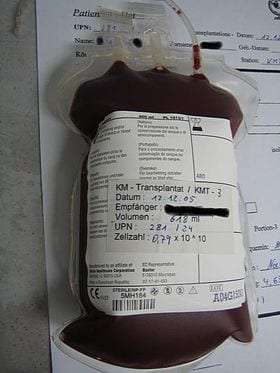The Volokh Conspiracy
Mostly law professors | Sometimes contrarian | Often libertarian | Always independent
Ethicists make the case for bone marrow transplantation markets

A cross-ideological group of ethicists recently signed a powerful public letter opposing the proposed federal regulation banning the sale of hematopoietic stem cells, used in bone marrow transplantation. These cells are used in the treatment of patients with serious blood or bone marrow cancer. Often, cell transplantation is needed to save the patient's life. The new rule would reverse a 2011 court decision holding that offering payment to bone marrow donors is not forbidden by the National Organ Transplantation Act, if it is done by means of a new, relatively noninvasive procedure known as apheresis.
Several of the signers are prominent libertarian scholars, such as Jason Brennan and Peter Jaworski, authors of the important recent book Markets Without Limits. But others are on the left, most notably the famous Princeton political philosopher Peter Singer.
The letter effectively refutes several standard arguments against cell markets, such as claims that they "exploit" the sellers, that they constitute immoral "commodification" of the body, that compensation undermines altruistic motivations for donation, and that such markets victimize the poor. The ethicists also emphasize the important point that banning the sale of these types of cells is likely to cost many innocent people their lives, as well as severely restricting freedom of choice:
The [proposed] Rule is unethical, both because it constitutes a ban on a practice that would help avoid preventable death, and because it limits freedom of choice in the absence of ethical grounds for such limitation.
The Rule, if enacted, may result in a greater number of preventable deaths. Approximately 1,000 people die each year for want of a matching donor. There is every reason to believe that the compensatory model can reduce the number of preventable deaths. Given the ethical importance of avoiding preventable death, removing an incentive for provision of hematopoietic cells is unethical, barring the presence of overriding ethical concerns.
Strong ethical grounds are required for limitations on free choice. This requirement is only strengthened when the choice is regarded by some as their best option. The Rule would remove what some consider their best option. While there may be cases where removing an option improves people's situation, there is no reason to believe that this is such a case, especially given the limited burdens incurred through apheresis….
While the letter focuses on stem cell markets, most of its arguments apply to organ and bone marrow markets more generally. Such markets, too, can save thousands of lives, and expand freedom of choice.
In previous posts, I have made the case for legalizing organ markets, and criticized claims that they should be banned in order to prevent "exploitation" of the poor (see also here). In a recent essay commenting on Brennan and Jaworski's book, I made some points in defense of organ markets that were not covered in the ethicists' letter:
[Some] critics believe that organ markets must be banned because it is inherently wrong to "commodify" the human body. Yet most of them have no objection to letting a wide range of people profit from organ transplants, including doctors, insurance companies, hospital administrators, medical equipment suppliers, and so on…..
Perversely, the only participant in the process forbidden to profit from the "commodification" of organs is the one who provided the organ in the first place. If you believe that people should be forbidden to sell kidneys because earning a profit from organs is immoral "commodification" of the body, you must either oppose paying all the other people who currently earn money from organ transplants, or explain why they, unlike the original owner of the kidney, are not also engaged in commodification. In reality, a person who actually earns a large part of her livelihood from organ transplants - like a doctor who specializes in such operations - is engaged in commodification of bodies to a far greater extent than the typical paid donor who earns a profit from a kidney once….
The same goes for people who argue that kidney markets should be banned because earning money from transactions involving body parts will somehow corrupt our morals. If the morals of doctors, nurses, and others are not corrupted as a result of repeatedly earning a large part of their livelihood from organ transplants, it is not clear why the morality of donors will be corrupted by earning money from selling a body part on just one or a few occasions….
Most economists and law and economics scholars who write about these issues, have long argued that organ, bone marrow, and stem cell markets should be legalized. Ethicists and political theorists have been much more skeptical. Hopefully, this letter will help change that, and increase both public and elite support for organ markets. The issue is quite literally a matter of life and death.


Show Comments (0)